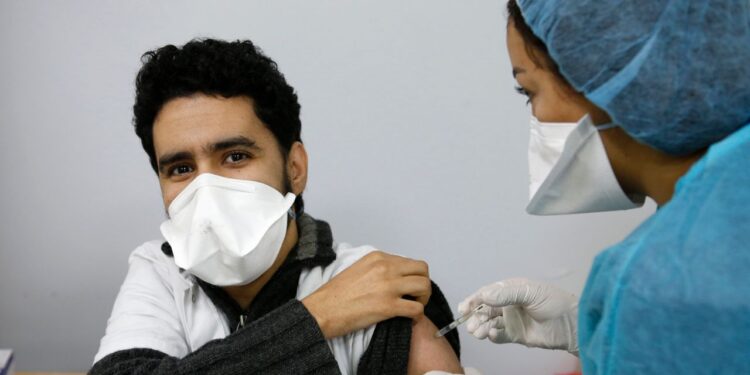Crédito: fuente
JOHANNESBURG—A small clinical trial in South Africa found that
AstraZeneca
PLC’s Covid-19 vaccine doesn’t appear to protect recipients against mild and moderate illness from a fast-spreading new strain of the coronavirus first detected in the country, according to limited results released Sunday.
The trial, which enrolled around 2,000 volunteers with a median age of 31, was too small and its participants too young to draw broad conclusions on the vaccine’s overall efficacy in protecting against the disease caused by the coronavirus, especially when it comes to hospitalizations or death. However, its findings contribute to concerns that a mutating virus is rendering existing Covid-19 vaccines less effective and that shots will need to be updated to protect against new virus strains.
STAY INFORMED
Get a coronavirus briefing six days a week, and a weekly Health newsletter once the crisis abates: Sign up here.
Johnson & Johnson
and
Novavax Inc.,
whose vaccines have yet to be authorized in any country, have also found that their shots were less effective in recent human clinical trials in South Africa, compared to trials in the U.S. or the U.K. But their vaccines were still found to be 50% or more effective at preventing mild or moderate cases of Covid-19 and even more potent at shielding recipients from severe illness and hospitalization from the new strain.
Sunday’s news release on the AstraZeneca trial in South Africa didn’t provide an efficacy rate for the vaccine. The Johnson & Johnson trial in South Africa included about 6,500 people while the Novavax one had 4,400.
Far and Wide
Thirty-two counties have reported cases of the coronavirus variant that first emerged in South Africa.
Countries where the B1.351 variant has been detected
U.K.
First case
reported
Dec. 12
U.S.
First case
reported Jan. 27
South Africa
First case reported Oct. 8

U.K.
First case
reported
Dec. 12
U.S.
First case
reported Jan. 27
South Africa
First case reported Oct. 8

U.K.
First case
reported
Dec. 12
U.S.
First case
reported Jan. 27
South Africa
First case reported Oct. 8

U.S.
First case
reported
Jan. 27
South Africa
First case reported Oct. 8
The University of the Witwatersrand in Johannesburg, which conducted the AstraZeneca trial, said it couldn’t make an assessment of whether the vaccine prevented more severe cases of Covid-19, because the relatively young trial participants were at low risk of falling seriously ill.
Still, the South African trials chief investigator and University of Oxford scientists who developed the vaccine with AstraZeneca said that, based on the results from other vaccine trials, they were optimistic that their shot would provide protection from severe Covid-19.
“This study confirms that the pandemic coronavirus will find ways to continue to spread in vaccinated populations, as expected,” said
Andrew Pollard,
director of the Oxford Vaccine Group at the University of Oxford, in the news release on the trial results. “But, taken with the promising results from other studies in South Africa using a similar viral vector, vaccines may continue to ease the toll on health care systems by preventing severe disease.”
A spokesman for AstraZeneca said the company believes “our vaccine could protect against severe disease.” Like other vaccine makers, AstraZeneca says it is working on updating its shots to target new variants of the virus. It hopes to have a new vaccine ready by the fall.
The South African strain, known as B.1.351, is already responsible for the majority of infections in South Africa and has been blamed for a sharp increase in Covid-19 cases in countries such as Mozambique and Zambia in recent weeks.
Taking Over
The new coronavirus variant quickly crowded out other strains in South Africa
Share of coronavirus strains found in South Africa




Researchers in the U.S., Canada, Israel and a number of European and African countries have also detected it in positive coronavirus test samples from people without a recent travel history, suggesting it is spreading in the community. In total, it has been identified in 32 countries, and virologists say it is likely to be present in others that don’t do systematic sequencing of positive test samples.
Scientists in South Africa and the U.K. believe that the B.1.351 strain is about 50% more contagious than earlier versions of the virus based on the much quicker rise in Covid-19 infections during South Africa’s second wave compared with the first and biological studies of changes to the structure of the virus.
South African researchers have said that the B.1.351 variant doesn’t appear to lead to more deaths or more severe cases of Covid-19.
Ravi Gupta,
a professor of clinical microbiology at the University of Cambridge who wasn’t involved in the South African AstraZeneca vaccine trial, said Sunday’s results underscored the need to update the current crop of Covid-19 vaccines against the new variants. Still, he said, he expects that the AstraZeneca shots will still provide some protection against the new strain. “We definitely still need to use the vaccines to protect people from severe illness,” he said.
Concern over the South African variant and its impact on vaccine efficacy has centered on a mutation known as E484K. Researchers believe that this mutation makes it harder for antibodies to get a grip on and neutralize the virus.
The same mutation has also been found in a separate variant discovered in Brazil. Researchers in the U.K. said earlier this month that they have found the E484K mutation in a small number of patients infected with another fast-spreading coronavirus variant that is driving infections there.
—Jenny Strasburg contributed to this article.
Corrections & Amplifications
The volunteers in a South African trial of AstraZeneca’s Covid-19 vaccine had a median age of 31. An earlier version of this article incorrectly said they had an average age of 32.
Write to Gabriele Steinhauser at gabriele.steinhauser@wsj.com
Copyright ©2020 Dow Jones & Company, Inc. All Rights Reserved. 87990cbe856818d5eddac44c7b1cdeb8








